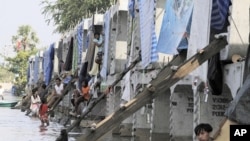Thai health authorities are on alert for outbreaks of disease as massive floods across the central plains show signs of receding. Medical specialists are especially concerned for communities inundated over several weeks, raising concerns of outbreaks of dengue fever, cholera and typhoid.
The United Nations says the death toll from Thailand’s most severe floods in five decades now exceeds 530.
But medical authorities say the government needs to remain vigilant to ensure the death toll does not rise further due to disease outbreaks.
Dr. Wongwat Liulak, an epidemiologist with Bangkok’s health department, says people are starting to run out of food and water. He says the diseases that would be of the most concern would be diseases of the digestive system, such as acute diarrhea and food poisoning.
Dr. Rekha Hanvesakul, a spokeswoman for BNH Hospital in Bangkok, says Thailand’s health system is facing major challenges in coping with the flood’s aftermath.
“It’s definitely a big challenge because of the quantity or mass of water that’s coming through. If it’s one or two days people can manage to deal with this. [But] because the quantity of or mass of water is so huge and a lot of people are living under these conditions for long periods of time disease becomes a real issue,” she said.
The Thai Public Health Ministry’s Department of Medical Sciences says a key concern is water-borne infections such as leptospirosis, due to water contaminated by animal urine. Other concerns include cholera and gastrointestinal diseases, such as typhoid. BNH also warns of poisonous snakes, scorpions, and centipedes pushed into people’s homes from the rising waters.
Asian Disaster Preparedness Center public health emergencies head, Dr. Marilyn Go, says children and elderly are especially vulnerable.
“The waterborne diseases are very common and acute diarrhea and e-coli or cholera will be the most common type as well as food poisoning and typhoid fever. The diarrhea can occur at anytime during the disaster,” she said.
But Dr. Somsak Chunharas, secretary general of the National Health Foundation, says the Ministry of Public Health has surveillance teams monitoring for outbreaks of leptospirosis as well as diarrhea related infections.
“I think the Ministry of Public Health has been doing quite a good job because they have set up a disease surveillance network and they have identified seven major diseases in the Thai surveillance system,” Dr. Chunharas said.
So far city officials have not reported any outbreaks of cholera or leptospirosis. The main concern has been influenza spreading in the crowded conditions in flood evacuation centers.
But medical practitioners see further problems as the water recedes. The Thai Senate this week pressed the government to begin water treatment in contaminated areas and take measures to prepare for possible post-flooding outbreaks. Other environmental groups warn against releasing toxic waters from inundated industrial estates without prior testing.
Thai Medical Authorities Concerned About Disease Outbreaks in Flood-Hit Areas
- By Ron Corben




